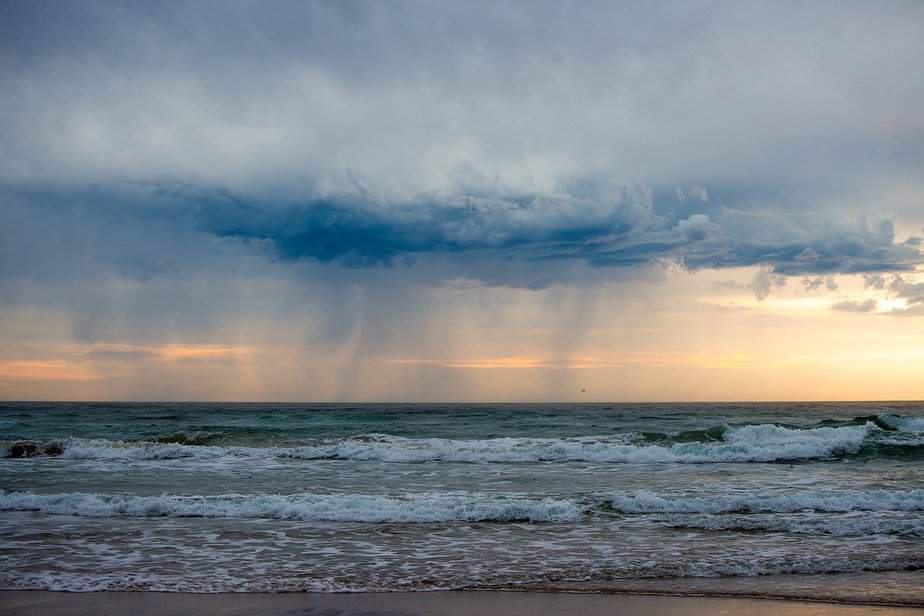When you’re snorkeling you’re already wet, so you might think that it doesn’t matter if it’s raining or not. Sure, the rain can be a nuisance as you’re making your way to and from the snorkeling area, but does the rain cause any other issues when snorkeling? Can you safely snorkel in the rain?
Yes, you can snorkel in the rain however you should factor in the severity of the rain and your risk tolerance. You might be surprised to learn that even just a little bit of rain can make snorkeling more uncomfortable and perhaps even dangerous. Depending on how hard it’s raining and the type of snorkel you have, rain water entering the snorkel tube is also legitimate concern.
Furthermore, rain also means clouds, which also means less sunlight and cooler temperatures. If there are also strong winds or even a storm, then it can stir up the seabed which reduces visibility. It can also cause river runoffs and result in dangerous tidal conditions.
In this article, we will discuss when it’s okay to snorkel in the rain, when it’s unsafe, and how even just a little bit of rain can affect your snorkeling experience.
Why is rain a concern when snorkeling?
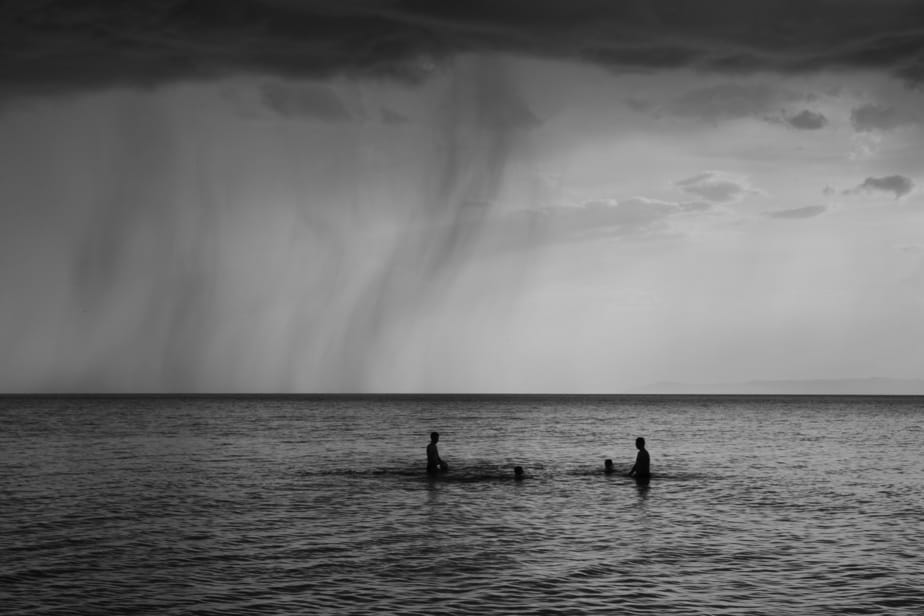
When most people imagine snorkeling, they picture a warm, idyllic, tropical climate, with clear skies and the sun shining bright, and floating along pristine water with visibility as far as the eye can see. They are not mentally prepared for those days when it’s raining and this can cause some complications.
First, when it’s raining it means there are clouds overhead blocking the sun leading to: decreased brightness and visibility, wind, and waves. This shift in the weather can be enough to deter some people who were picturing a warmer atmosphere.
Second, when you’re snorkeling, you don’t want water to enter your snorkel for fear of swallowing it. When it’s raining, that adds another risk which is that some rain drops may make their way down the snorkel. If you have an open-top snorkel, this can affect your ability to breathe.
Third, there is also the question of how hard it’s raining. If it’s just a light drizzle during sunshine then there is no cause for concern. However, if it’s heavy rain with storms and thunderclouds then you should probably snorkel another day.
Sometimes life likes to play cruel jokes, and one such joke is that the best snorkeling sites around the world are typically located in tropical areas which are naturally accompanied by tropical rains. Sometimes you have to take the bad with the good, as they say.
Depending on the season, it’s possible for you to snorkel with idyllic conditions every single day. This can greatly affect your enjoyment of snorkeling, and conversely, snorkeling during the rainy season can negatively affect your snorkeling experience. With that said, if it is only raining lightly, then it should have little to no impact on your enjoyment.
However, heavy rain is typically accompanied by other unwelcome weather patterns such as wind, thunderstorm, and waves. Thus, depending on the severity of the rain, it might be a sign that it’s too dangerous to go snorkeling.
A note on weather forecasts
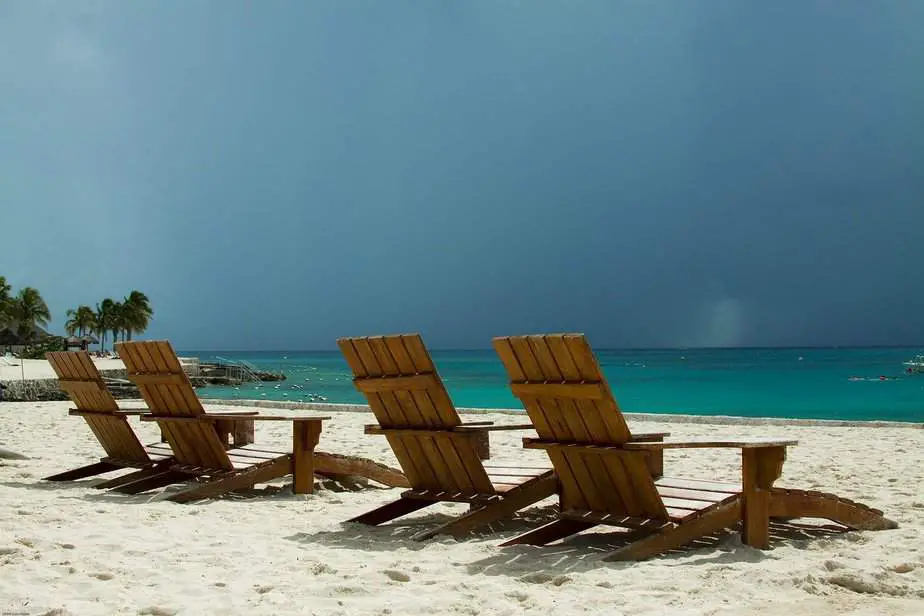
If you’re on a snorkeling vacation, chances are you are in the tropics somewhere. There are thousands of tropical locations around the world that might experience rain. One thing to keep in mind is that the rain in the tropics is unlike rain in other places in a few ways.
Thus, if you’re checking the weather forecast for the day and feeling bummed because it says “heavy rain expected”, then it may not be as bad as it seems. Here’s why.
In tropical climates, the rain is often coming and going. In some places, rain is even referred to as “liquid sunshine” because of how quickly they appear, pour the area with rain, and then leave to let the sunshine through again.
It’s also likely that, when the seasons are transitioning, that the rain only appears at night. Another example is in Southeast Asia, during the monsoon season, the rain will typically pour heavily for only an hour before it leaves. There are many examples over the globe where the rain will appear for only a short while and then stop.
A bigger issue than just rain are the appearances of a tropical thunderstorm. A thunderstorm will generate a lot of heavy rain and wind which can disturb the sediment and decrease visibility greatly. Thankfully, these occur rarely, but when they do, do not take them lightly.
One difference between the rain in tropical locations and the rain in other locations is that tropical rain can feel like a warm shower, so at least you won’t feel colder than you already were.
While many people think that seeing rainfall on the weather forecast would ruin a snorkeling session, it’s not always a bad thing.
For instance, if you’re in the water then you’re already so you aren’t afraid of getting wet anymore. Also, after the rain the sunlight afterwards is less harsh which is a great situation for people who get sunburned easily.
Next, as we mentioned, the rain in tropical areas comes and goes really quickly. Even if you’re in the middle of snorkeling and it starts to rain, if you can endure it for 20 minutes or so, then it will depart.
Additionally, weather forecasts aren’t always accurate. Even if it predicts that there will be heavy rain in the area, it might not happen at all or it will happen only briefly before departing. It’s not necessarily a deal breaker if the weather forecast predicts some rain. Unless the weather service specifically uses the word “storm”, you will likely be fine.
How does rain affect visibility when snorkeling?
Most of the time, tropical rain will go as quickly as it comes, but there are times when the rain is more persistent. Depending on the location and duration of the rain, it can dramatically affect your snorkeling experience.
For instance, if the rain is heavy and long-lasting, then it will have more of a negative impact on visibility, especially in regards to cloudiness from runoff. Stronger rain will carry more particles into the water. Additionally, heavy rain is often accompanied by wind and waves that make it harder to see underwater.
The major disadvantage that rain causes snorkelers is that it can drastically reduce the visibility of the water, making your snorkeling session less enjoyable and perhaps even a little dangerous. In this section, we’ll discuss how specifically rain can reduce your visibility.
Runoff particles
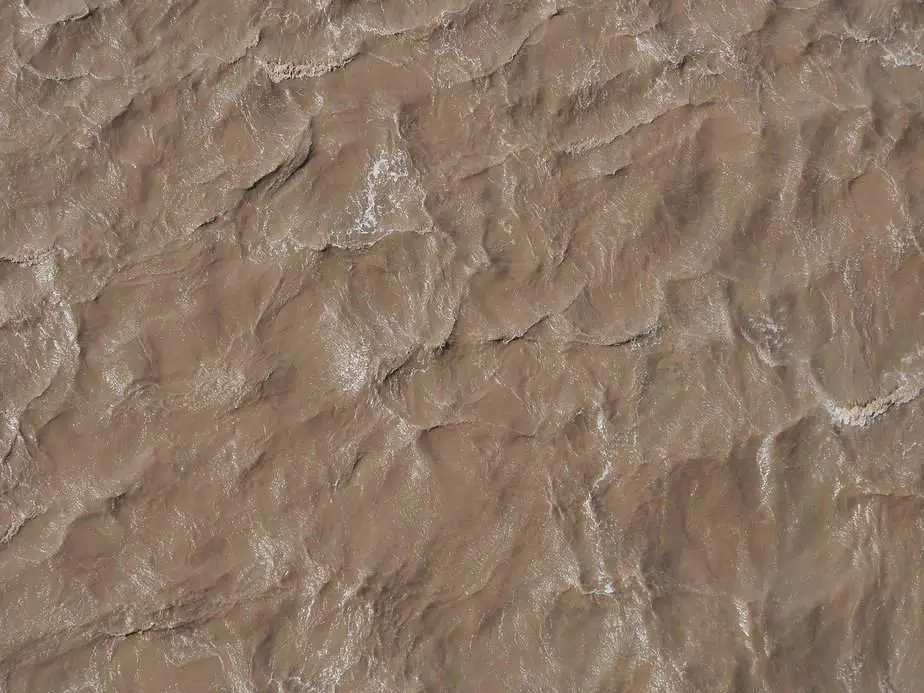
If you’re snorkeling in the ocean but close to the shore or in a freshwater lake, you may find that your visibility is reduced as soon as it starts raining. What’s happening is runoff (i.e. particles from the shore such as sand, mud, and other debris) is being carried into the water and results in what feels like an underwater sandstorm.
This phenomenon can also occur when a river, stream, or drain flows into the body of water you are snorkeling in. Now, you may still be able to snorkel despite the reduced visibility if you have a powerful enough underwater flashlight, but snorkelers generally don’t carry a flashlight. Whatever the case, it is likely your enjoyment will be greatly reduced.
Depending on where you’re snorkeling, the cloudiness can remain for up to two days before it settles. Kicking up more sediment by accident would only prolong the cloudiness.
Snorkeling sites that are close to open water will be subject to stronger currents and this can cause the water visibility to return to normal faster than an enclosed bay, so if you’re able to wait it out, then you may still be able to snorkel in the afternoon or so.
Increased nutrients in the water

The runoff can also bring more nutrients into the water which sounds good but it can negatively impact visibility which is a theme of this section.
There may not be as much of an effect in saltwater, but in freshwater, the high levels of nutrients will cause the algae to bloom, resulting in green water that is tough to see through.
The algae can begin to spread as quickly as one day after heavy rain and can remain for up to a week in a freshwater lake.
Thankfully, in other locations, the nutrients are quickly diluted so the algae have no chance to bloom. However, if you are snorkeling in a lagoon or bay, then you might have to contend with algae.
Rain clouds
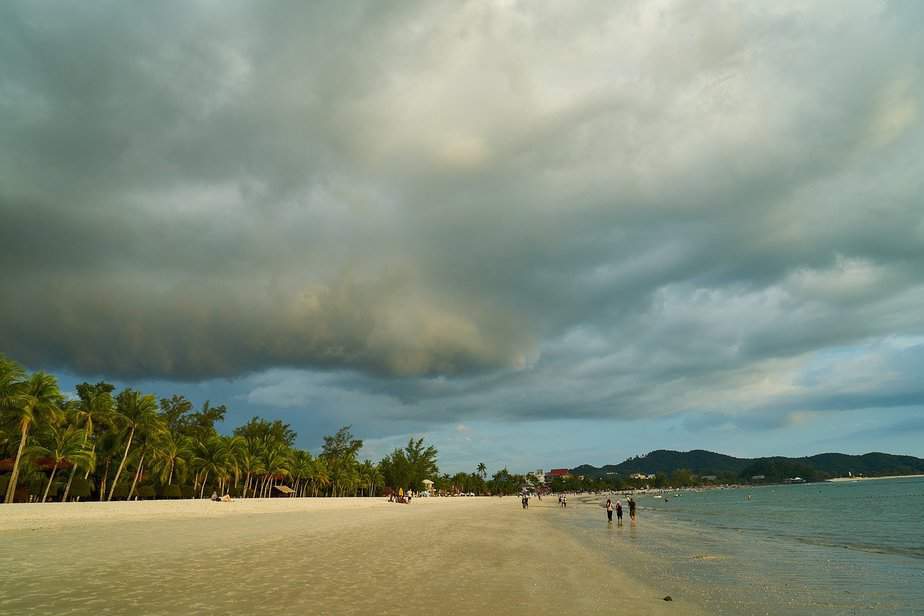
You can’t have rain without clouds, and clouds will block out the sunlight so that it’s darker and harder to see underwater. Under normal circumstances, the bright sun makes everything nice and easy to see. Since snorkelers are right by the surface of the water usually, they benefit the most from the natural light whereas scuba divers rely on their dive torch as their light source.
However, when there are heavy clouds overhead, everything will be darker and less colorful which is particularly disappointing if you intend to take photos or videos.
Waves
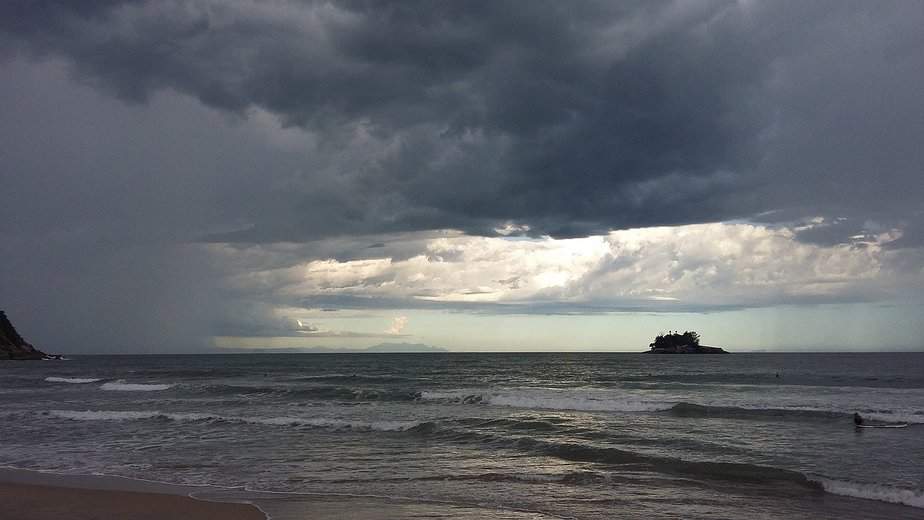
Just like how rain comes with clouds, so too does rain come with wind and waves. We’ve mentioned in another article how fast the wind needs to go to cause waves and swells to form. Waves that are really tall can reduce the visibility at the surface and can make maintaining visual contact with your snorkeling buddy difficult.
How does the grade of rain affect snorkeling?
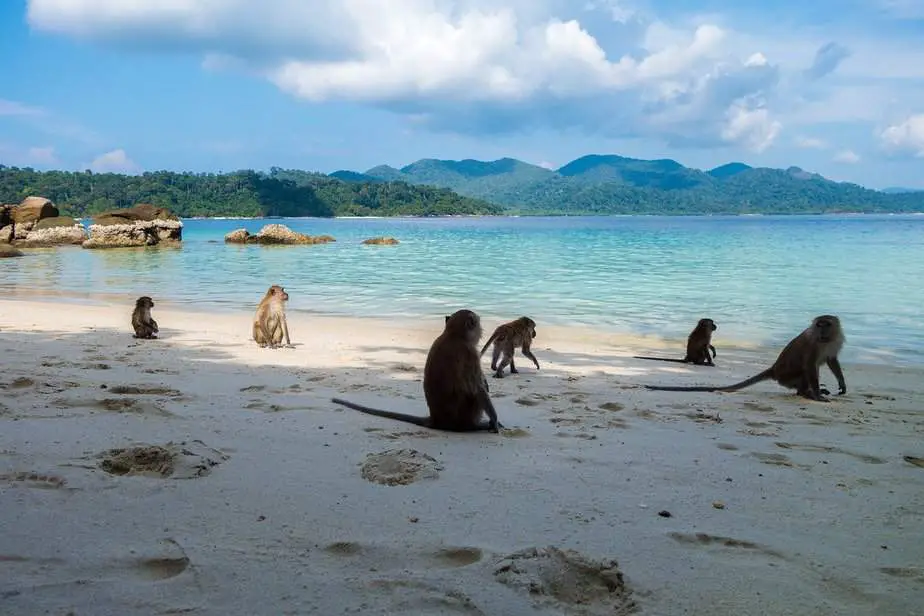
As the holidays approach, many will start booking tickets to their favorite tropical paradise and look feverishly at the weather. They want to ensure that everyday is sunny and vibrant for the duration of their stay, and anything less than that to be a disaster.
As we have repeatedly pointed out already, the weather in tropical areas is quite different, and the presence of rain is not necessarily a dealbreaker. It’s quite the surprise to see for the first time a small shower appear out of nowhere, drizzle for twenty minutes, and then disappear. Some people are confused when they leave their hotel to see that the ground is wet but the sun is shining brightly. That means it was literally just raining moments before.
As such, it doesn’t matter if the forecast predicts rain because you can snorkel when it’s raining and chances are it will leave before it causes any major disruptions. Just pay attention to majorly low depressions that are a sign of an impending storm.
Snorkeling in light rainfall
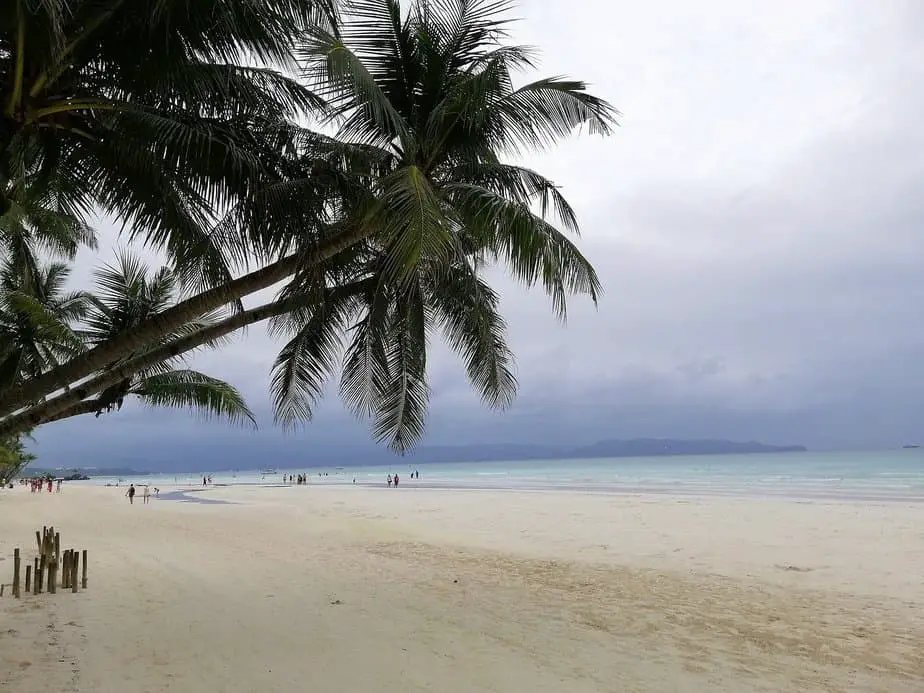
Very light rainfall is a non-issue. Even if it’s warm outside and you’re afraid of a cold shower, it’s totally fine because the tropical rains are a lot warmer than western rains. Plus, if you’re snorkeling then you’re already wet, so it literally doesn’t affect anything. It can even be quite fun to laugh at how inconsequential the light rainfall is, and it will soon pass.
The only people who may be bothered by light rainfall are those who are still dry and on the way to a snorkeling site or are those who are on their way out. They can just wait it out and then continue on their merry way, or get a little bit wet. It shouldn’t be enough to majorly disrupt anyone’s plans.
There is not any preparation needed to snorkel in light rainfall. You don’t need to bring anything extra other than a reliable dry bag which is always a good choice to keep your clothes dry. For the most part, if you’re already in the water, you can continue without any interruption.
Snorkeling in heavy rainfall
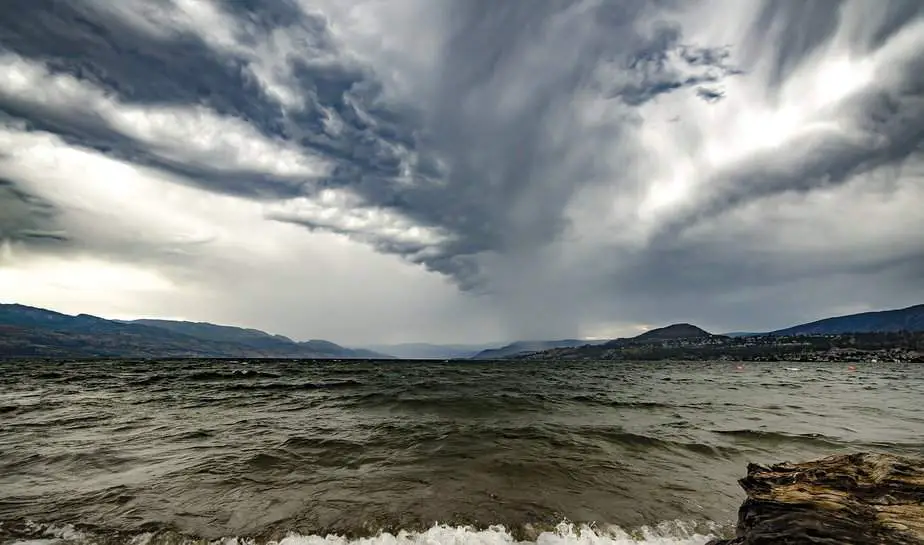
With respect to one’s enjoyment of snorkeling, light and even moderate rainfall are rarely ever a concern. However, if the rain is part of a storm or some other rough weather, then it changes things. Everyone has a different tolerance for how bad the weather can be before they cancel a snorkeling trip.
If the rain is heavy and persistent, plus if the location is susceptible to water runoff, then you may still be able to snorkel but it won’t be as enjoyable.
Heavy rain will disrupt the surface and the rainclouds will cover the skies, darkening everything below. Thus, the visibility drops on two levels: there is literally less sunlight and there will likely be more particles in the water.
The presence of stronger winds will cause the temperature to drop and can easily cause wind chill even if you are wearing a rashie or wetsuit.
In general, it’s just not worth it to snorkel during heavy rain even if it’s possible. The experience will be much less enjoyable and there’s no certainty as to when the storm will pass. It’s better to postpone your snorkeling plans until the rain clears up.
Does rain affect marine life?
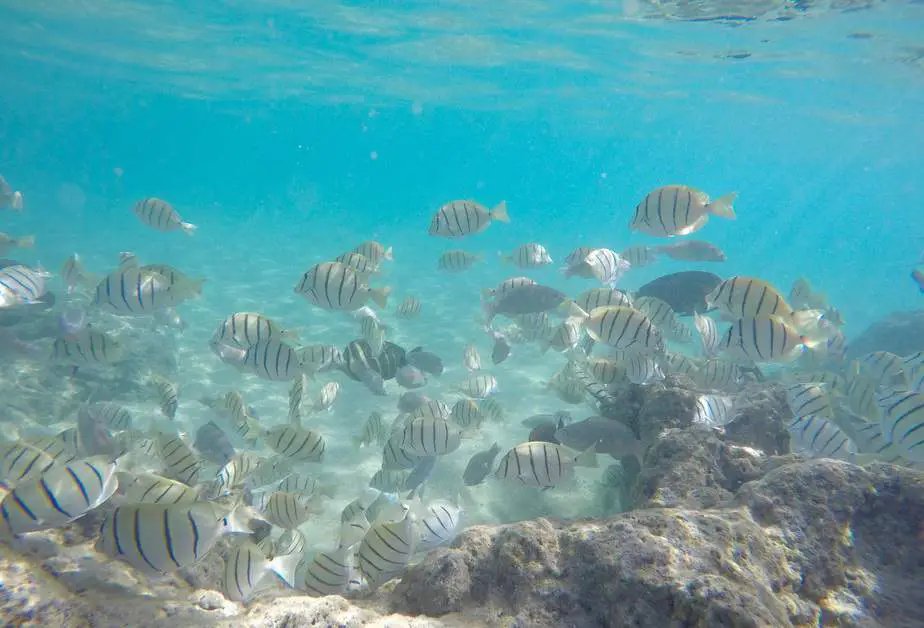
The marine life are not so much bothered by the rain because it’s a naturally occurring phenomenon that they have evolved to handle.
If the rainfall is particularly heavy, then shallow corals might close up until the water temperature and salt content around them returns to normal.
Furthermore, you will notice that some fish will keep their distance from the surface when it’s raining for similar reasons. This further adds to the fact that it’s harder to see while snorkeling when it’s raining because there are even fewer fish visible.
Conversely, some freshwater fish may be attracted to the surface because they want to interact with the increased dissolved oxygen levels created by the surface movement of the rain. Runoff might also flush a tasty treat into the water, tempting certain fish to check it out.
However, if you’re lucky enough to still find marine life when it’s raining, then they will likely be acting like normal.
Which type of snorkel to use when it’s raining?
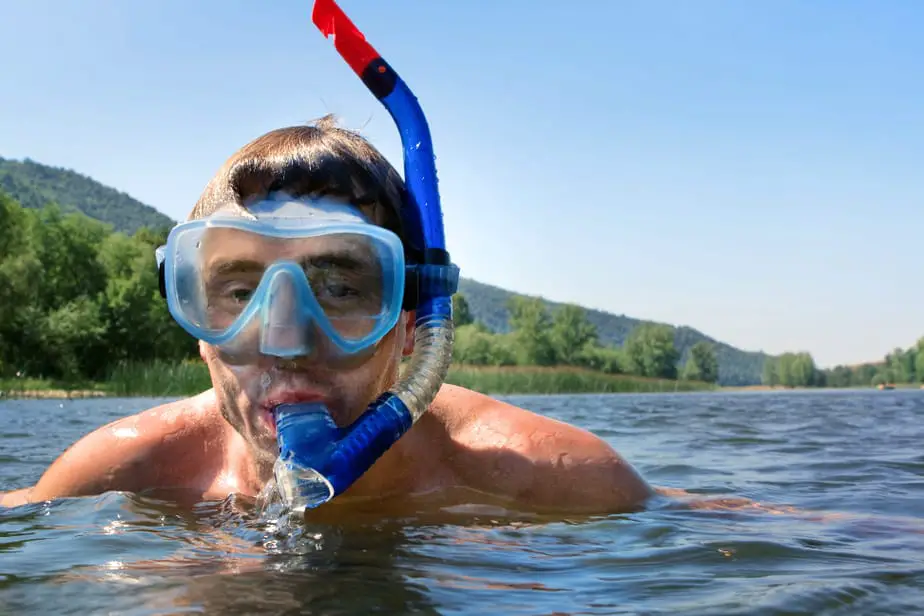
As we mentioned, using an open-top snorkel can be problematic in general, let alone when it’s raining. Instead, we recommend using either a semi-dry or dry snorkel if you’re going to be snorkeling in rough waters.
Both a semi-dry and dry snorkel will have something called a splash guard covering the top opening. The splash guard angles the opening in such a way that most of the water that splashes on it won’t get into the tube.
The little bit of water that does get inside will make its way to a water reservoir with a purge valve. Snorkelers can purge the water in the reservoir any time by simply blowing out the snorkel with their mouth.
A dry snorkel also comes with a sealing mechanism called a float valve. The float valve can detect if the snorkel is submerged underwater. If it is, then the valve will naturally float up and push the seal up until it closes the opening, preventing any water from flooding down the tube.
As you can see, a semi-dry and dry snorkel are similar except for the float valve. You can’t go wrong with either if you plan on snorkeling in the rain without water entering the tube.
Will my snorkeling trip get cancelled if it’s raining?
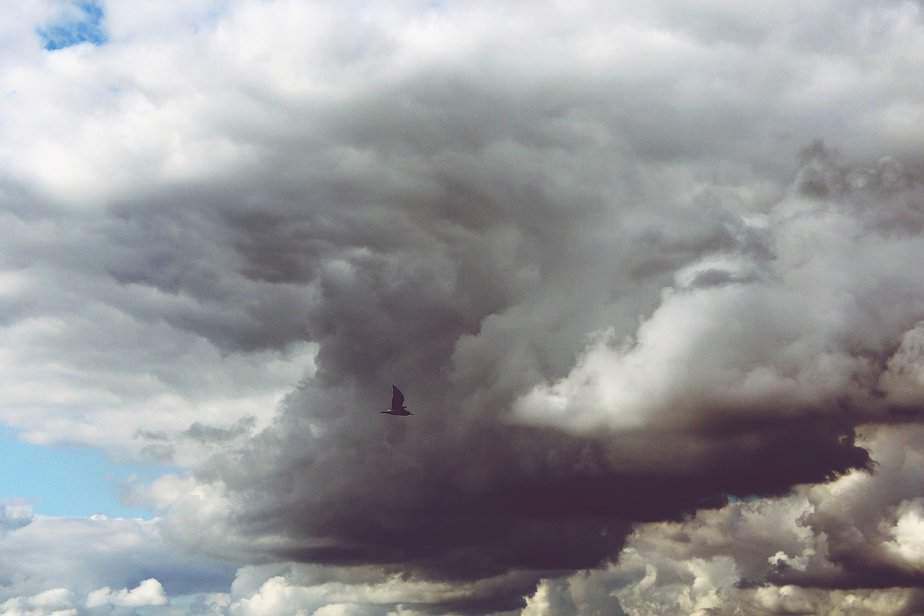
Many people wonder if the snorkeling tour they booked will be cancelled if it is raining the day it is scheduled. The answer is: not necessarily. If the rain is just a brief and light tropical rain, then it’s unlikely the tour operator will cancel the trip. A trip will only be cancelled if there is a major safety concern.
For instance, if it is raining heavily enough that transport safety or water safety is jeopardized, then the trip will likely be cancelled. Even if you feel that you are a strong swimmer who can handle rougher waters, the touring company will cater to the average tourist who may not be comfortable in rough weather.
Again, most of the time light rain is not an issue. However if a storm is forecast, or there is heavier rain than expected, then yes it may be cancelled. The typical tropical weather is not likely going to get any snorkeling tours cancelled.
When you shouldn’t snorkel in the rain

There are times when it’s fine to snorkel in the rain, and there are times when you should try again another day. If you’re on a cruise and there is a snorkeling tour included in the package, more than likely the tour operators or instructors will make the decision on whether or not it’s still safe to snorkel.
As we mentioned, they may cancel a trip if the weather is deemed too harsh for a beginner snorkeler, or at least postpone it until the rain lets up.
If the decision is up to you, then it depends on how strong of a swimmer you and your snorkeling buddies are. However, if there is a storm or cyclone, then the decision not to snorkel is clear-cut. It’s not the view or the rain we’re concerned about when there’s a storm brewing; it’s the safety issues that we prioritize above all.
To start, a storm will generate rougher waters. The waves that you encounter will be much stronger than the waves you typically expect. However, the main dangers will probably come from tides.
Tides are the ebb and flow of the ocean, but during a storm, the increased water flows can amplify how much tides flow. If you are ever caught in a riptide, it doesn’t matter how strong or experienced of a swimmer you are.
I saw firsthand someone get carried away by a riptide once in Thailand. He swam past the marked lanes and suddenly he could not control where he was going. There was nothing he could do. Thankfully, he was wearing a life vest so even as he tired he remained afloat. He was later rescued by speedboat, but it was a harrowing experience for him and even for me, who witnessed it happen. He could have easily lost his life.
You should not underestimate mother nature. When you are caught in its destructive force, there is nothing you can do except pray. Currents can quickly change during a storm until they are too strong for any human to handle, so don’t even risk it.
Parting words
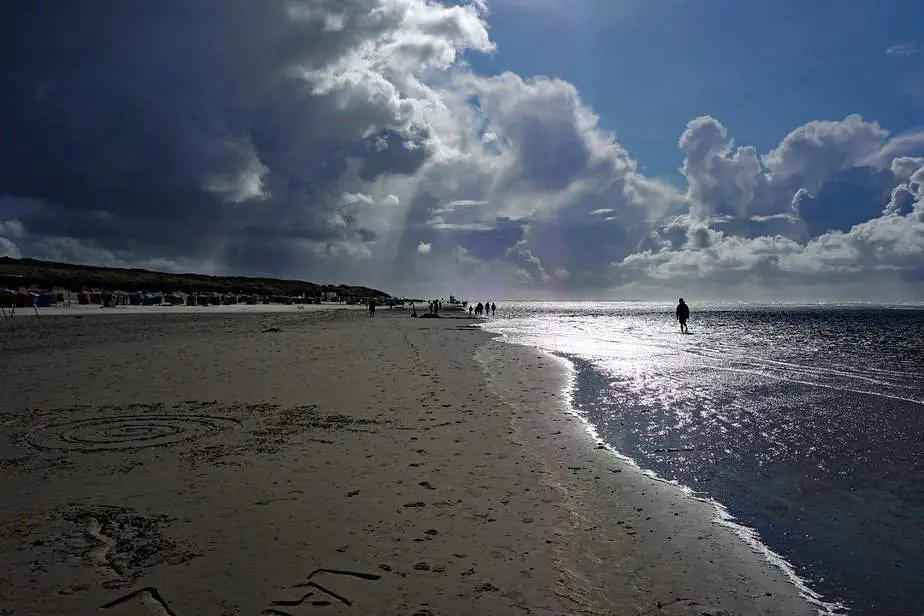
To sum it up, don’t let a little bit of rain ruin your snorkeling plans. You only need a plan B if there is heavy persistent rain or a severe storm on the horizon.
If the weather forecasts rain, unless it indicates that there is a possibility of a storm, you likely don’t need to alter your plans in the slightest. The tropical rains are warmer and don’t last very long. In 10-20 minutes, it will have moved on already. If you’re already in the water and wet, you might not even care that it started raining.
As the rain gets heavier, you can expect increased waves, wind, stronger currents, and possibly some murky river runoff. You can still continue snorkeling but it will be less enjoyable.
Most in-season snorkeling should be fine, however the rains during the off-season may bring increased risks. You need to be honest and realistic with your assessments. If you’re not a strong swimmer, you should decide to stay home.
It’s not worth cancelling a trip just because there’s a little bit of rain, but a storm is another matter. If you’re with a snorkeling tour, then it’s up to the instructor to make the judgment call on whether the trip should be cancelled. For the most part, yes, you can still snorkel in the rain.

